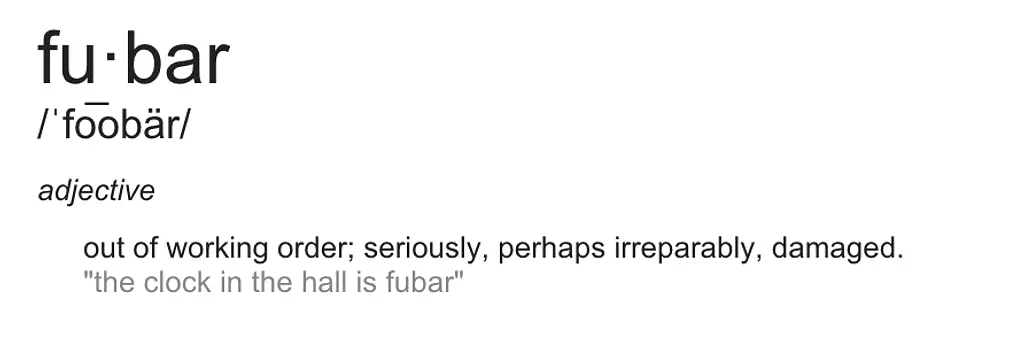Meaning of FUBAR
FUBAR is an acronym for Fouled Up Beyond All Recognition.

In the realm of acronyms and slang, few words capture the essence of complete and utter chaos like FUBAR. This term, though not often found in formal language, has made its mark in popular culture, military jargon, and everyday conversation. In this post, we'll explore the origin, meaning, and evolution of FUBAR, understanding its significance beyond just being a catchy acronym.
Origins of FUBAR
FUBAR first emerged from the gritty trenches of military slang during World War II. Originally an acronym, FUBAR stands for "Fouled Up Beyond All Recognition", although a more colorful and explicit version of the first word is often used, "Fucked Up Beyond All Recognition". The term was born out of the need for a succinct way to describe situations that had gone disastrously wrong.
World War II to Popular Culture
The term's use was popularized among soldiers during World War II, a time marked by intense and often chaotic circumstances. FUBAR captured the gravity of situations that were irreversibly damaged or messed up. Post-war, the term seeped into civilian vernacular and eventually became a part of popular culture, being featured in movies, TV shows, and literature.
The Meaning and Usage of FUBAR
While its origins are military, the meaning of FUBAR has broadened over time. In its essence, FUBAR is used to describe any situation, project, or plan that has gone terribly wrong, to the point of no return. It's a recognition of a state of disarray so profound that recovery is unlikely or impossible.
In modern usage, FUBAR has transcended its military origins and is used in various contexts, from business failures to technological disasters. It often carries a hint of dark humor, acknowledging the scale of a mess-up in a somewhat light-hearted manner.
The Psychological Implications of FUBAR
Using FUBAR is not just about describing a failure; it's also about expressing a sense of frustration and resignation. When a situation is labeled as FUBAR, it implies that it has surpassed conventional failure and entered the realm of the absurd. This acknowledgment can often bring a sense of relief or a resigned acceptance of reality.
FUBAR's popularity also highlights the human tendency to use language creatively, particularly in stressful or difficult situations. Slang terms like FUBAR provide a release valve for emotions, offering a way to communicate complex feelings in a simple, relatable manner.
FUBAR in the Digital Age
In the age of social media and digital communication, FUBAR has found a new life. It's used in online forums, social media posts, and even in professional emails (albeit cautiously) to convey the extent of a problem succinctly.
FUBAR's endurance in our vocabulary demonstrates the adaptability and longevity of certain slang terms. It shows how some words can capture the imagination and become a lasting part of our language, evolving with time and context.
Conclusion
In conclusion, FUBAR is more than just an acronym or a word; it's a linguistic symbol of the chaos and unpredictability of life. Its journey from military slang to mainstream language reflects its powerful ability to convey a complex mix of frustration, humor, and resignation.
Understanding the meaning and history of terms like FUBAR offers insight into how language evolves and adapts to our experiences. It reminds us of the creative resilience of human communication, even in the face of complete disorder. So next time you encounter a situation that seems FUBAR, remember the rich history and human connection behind this seemingly simple term. It's a testament to our ability to face chaos head-on, with a word that encapsulates the mess and keeps us moving forward.
Published on
Updated on